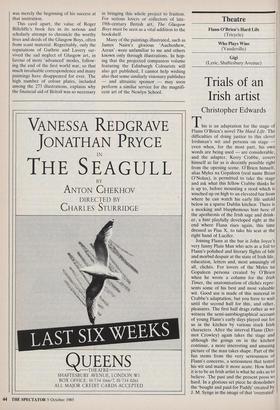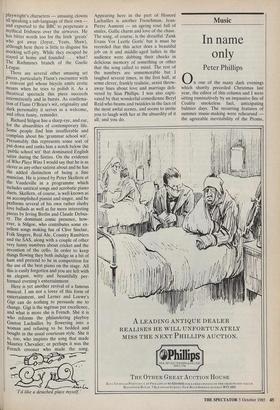Theatre
Flann O'Brien's Hard Life (Tricycle) Who Plays Wins (Vaudeville) Gigi (Lyric, Shaftesbury Avenue)
Trials of an Irish artist
Christopher Edwards
This is an adaptation for the stage of Flann O'Brien's novel The Hard Life. The difficulties of doing justice to this clever Irishman's wit and persona on stage even when, for the most part, his own words are being used — are considerable, and the adapter, Kerry Crabbe, covers himself as far as is decently possible right from the opening scene. O'Brien himself, alias Myles na Gopaleen (real name Brian O'Nolan), is permitted to take the stage and ask what this fellow Crabbe thinks he is up to, before mounting a stool which is winched up on high to an elevated bar from where he can watch his early life unfold below in a sparse Dublin kitchen. There is a mocking and blasphemous hint here of the apotheosis of the Irish sage and drink- er, a hint playfully developed right at the end where Flann rises again, this time dressed as Pius X, to take his seat at the right hand of Lucifer.
Joining Flann at the bar is John Joyce's very funny Plain Man who acts as a foil to Flann's polished and literary flights of bile and morbid despair at the state of Irish life, education, letters and, most amusingly of all, clichés. For lovers of the Myles na Gopaleen persona created by O'Brien when he wrote a column for the Irish Times, the anatomisation of clichés repre- sents some of his best and most valuable wit. Good use is made of this material in Crabbe's adaptation, but you have to wait until the second half for this, and other, pleasures. The first half drags rather as we witness the semi-autobiographical account of young Flann's early days played out for us in the kitchen by various stock Irish characters. After the interval Flann (Der- mot Crowley) again takes the stage and although the goings on in the kitchen continue, a more interesting and amusing picture of the man takes shape. Part of the fun stems from the very seriousness of Flann's concerns, a seriousness that tested his wit and made it more acute. How hard it is to be an Irish artist is what he asks us to believe. The past and the present press so hard. In a glorious set piece he demolishes the 'bought and paid-for Paddy' created by J. M. Synge in the image of that 'overrated'
playwright's characters — amusing clowns all speaking a sub-language of their own - and exported to the BBC to perpetuate a mythical Irishness over the airwaves. He has bitter words too for the Irish 'greats' who got away (Joyce, Yeats, Shaw), although here there is little to disguise his mocking self-pity. While they escaped he stayed at home and founded • „ what? The Rathmines branch of the Gaelic League.
There are several other amusing set pieces, particularly Flann's encounter with a convent girl whose bicycle emits erotic moans when he tries to polish it. As a theatrical spectacle this piece succeeds intermittently and in bursts. As confirma- tion of Flann O'Brien's wit, originality and dark personality it serves as a welcome, and often funny, reminder.
Richard Stilgoe has a sharp eye, and ear, for the absurdities of contemporary life. Some people find him insufferable and complain about his 'grammar school wit'. Presumably this represents some sort of put-down and ranks him a notch below the `public school wit' that dominated English satire during the Sixties. On the evidence of Who Plays Wins I would say that he is as clever as any other satirist about and he has the added distinction of being a fine musician. He is joined by Peter Skellern at the Vaudeville in a programme which Includes satirical songs and acrobatic piano duets. Skellern, of course, is well known as an accomplished pianist and singer, and he performs several of his own rather slushy love ballads as well as far more interesting pieces by Irving Berlin and Claude Debus- sy. The dominant comic presence, how- ever, is Stilgoe, who contributes some ex- cellent songs making fun of Clive Sinclair, Folk Singers, Real Ale, Country Ramblers and the SAS, along with a couple of other very funny numbers about cricket and the invention of the cello. In order to keep things flowing they both indulge in a bit of ham and pretend to be in competition for the use of the best piano on the stage. All this is easily forgotten and you are left with an elegant, witty and beautifully per- formed evening's entertainment.
Here is yet another revival of a famous musical. I am not a lover of this form of entertainment, and Lerner and Loewe's Gigi can do nothing to persuade me to change. Gigi is the ingenue par excellence, and what is more she is French. She it is who reforms the philandering playboy Gaston Lachailles by flowering into a woman and refusing to be bedded and bought in the usual courtesan style. She it Is, too, who inspires the song that made Maurice Chevalier; or perhaps it was the French crooner who made the song.
Td like a detached place myself.' Appearing here in the part of Honore Lachailles is another Frenchman, Jean- Pierre Aumont -- an ageing roué full of smiles, Gallic charm and love of the chase. The song, of course, is the dreadful `Zank Evans Vor Leetle Gorls' but it must be recorded that this actor does a beautiful job on it and middle-aged ladies in the audience were dabbing their cheeks in delicious memory of something or other that the song called to mind. The rest of the numbers are unmemorable but I laughed several times, in the first half, at some clever, frankly realistic, sexist throw- away lines about love and marriage deli- vered by Sian Phillips. I was also capti- vated by that wonderful comedienne Beryl Reid who beams and twinkles in the face of the most awful scenes, and seems to invite you to laugh with her at the absurdity of it all; and you do.



























































 Previous page
Previous page